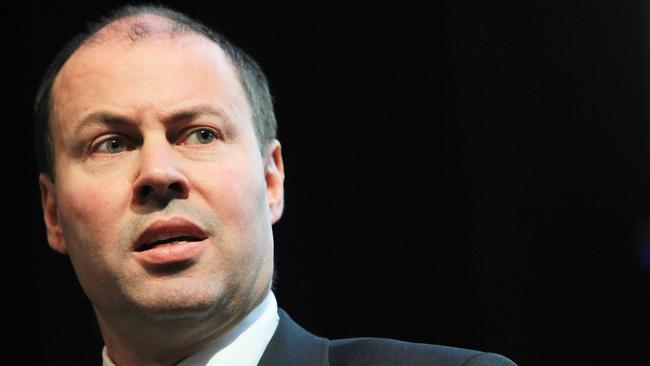New doubts in Frydenberg case
Josh Frydenberg’s mother arrived in Australia using a valid passport and was considered to be of “Hungarian nationality’’.

Energy Minister Josh Frydenberg’s mother arrived in Australia using a valid passport and was considered to be of “Hungarian nationality”, according to official immigration documents.
Mr Frydenberg last week sought urgent legal advice after it emerged he could hold Hungarian citizenship through his mother, Erika, who was born in Budapest.
Citizenship lawyers yesterday said the matter would need to be determined by experts in Hungarian citizenship law.
Documents dating back to 1951 — compiled by NSW Customs Department senior officer J.H. Coventry — confirm the family of Samuel Strausz arrived in Sydney from Italy, via Fremantle, on December 30, 1950.
Mr Frydenberg’s mother, Erika Strausz, aged 7, and the rest of her family, signed a form applying for a “certificate of exemption” from provisions of the Immigration Act of 1901-1949 for a two-year period.
In that document she listed her nationality as “stateless” although this appears to conflict with Mr Coventry’s report which states the Strausz family were all of “Hungarian nationality”.
The immigration report was unclear about whether the family was travelling on Hungarian passports or some other form of valid travel documents for those displaced during World War II.
Under section 44 of the Constitution, an MP cannot sit in federal parliament if they hold dual citizenship. Six MPs have already been forced out of the parliament after falling foul of the provision.
On Friday, Mr Turnbull condemned suggestions that Mr Frydenberg, who is Jewish, could be a dual citizen and noted that Hungary had “stripped (Mr Frydenberg’s) mother and her family of their citizenship and would have pushed them into the gas chambers” during the war.
Mr Frydenberg is treating the issue seriously and is seeking further advice, although he remains satisfied that he has never been a Hungarian citizen.
Greens leader Richard Di Natale yesterday said while the process of checking MPs for dual citizenships could raise sensitive historical issues, the more important issue was to uphold the law and the integrity of the Australian Constitution.
“In the end, the High Court does not make its judgment based on the morality of each individual case. It makes it on the basis of the law. That is ultimately the basis on which these decisions are made,” Senator Di Natale said. “And some of them are very complex. And some of them, indeed, as is the case with Mr Frydenberg, raise huge difficulties and concerns which many of us share. But ultimately the High Court makes these decisions on the basis of the law.”
Australian National University citizenship expert Kim Rubenstein told The Australian thequestion of whether Mr Frydenberg was a Hungarian citizen could be adequately resolved only by an expert in Hungarian law.
“An expert in Hungarian citizenship needs to determine whether he is recognised by Hungary,” Professor Rubenstein said. “If Hungarian law gives him a right to apply for it then the question is did he — and I see he has reported he didn’t — but if Hungary bestowed citizenship without application then he may be a dual citizen. It all depends on Hungary’s law.”
Changes to Hungarian citizenship law made in January 2011 allow anyone who was a Hungarian citizen — or a descendant of a Hungarian citizen before 1920 or between 1941 and 1945 — the ability to apply to become a Hungarian citizen. Mr Frydenberg has made clear his mother never applied for Hungarian citizenship and was stateless when she came to Australia. Under Hungarian law, the child of a Hungarian citizen shall become a Hungarian citizen by birth.







